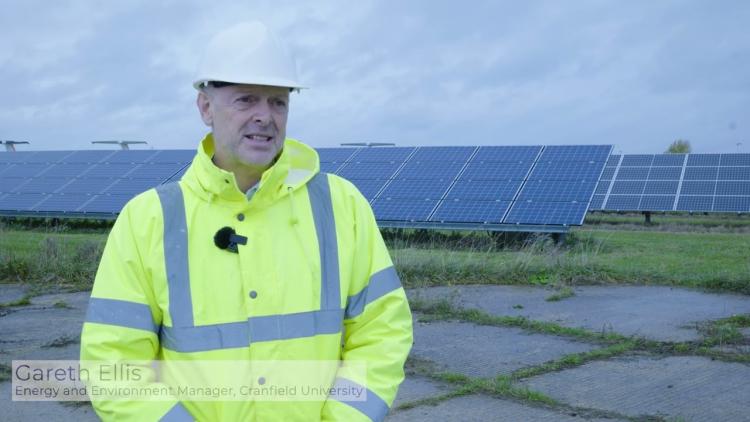New video showcases university's net zero ambitions

Cranfield University, which received funding under the Public Sector Decarbonisation Scheme Phases 2 and 3, is featured in this three-minute video which explains how the institution will achieve net zero emissions by 2030.
Funding inspires Cranfield's ambitions
A university famed for having its own airport has showcased its ambitious scheme to reduce carbon emissions.
Cranfield University, which received funding under the Public Sector Decarbonisation Scheme Phases 2 and 3, is featured in the three-minute video which explains how the institution will achieve net zero emissions by 2030.
Cranfield University Energy and Environment Manager Gareth Ellis says the video offers a useful way to tell the Cranfield story as well as sharing information which is key to reducing the use of fossil fuels.
He said: “We have set ourselves an ambitious target which means we need to virtually eliminate our use of fossil fuels.”
“The Public Sector Decarbonisation Scheme funding has helped us significantly reduce gas consumption on the district heating; and the extension to the solar farm, the installation of LED lighting projects and the large battery contribute to reducing electricity use and better balance demand.”
The Public Sector Decarbonisation Scheme is initiated by the Department for Energy Security and Net Zero and delivered by Salix Finance.
The video, created for Salix Finance, also features Pro Vice Chancellor, School of Water, Energy and the Environment, Professor Chris Fogwill. He said that the university had been working on decarbonisation for more than 10 years and was now 50% of the way to achieving its target.
Head of Projects and Development (Facilities) at Cranfield, Tracy Flynn, also featured in the video, focuses on the importance of cost and driving efficiencies.
Cranfield University was awarded £4.9 million for a wide range of environmental improvements entered on its district heating system under the Public Sector Decarbonisation Scheme phase 2 and a further £11.3 million under phase 3, delivered by Salix Finance.
The projects have involved the replacement of aging 24-year-old boilers with air source heat pumps, upgrading of the building management system, additions to the district heating system, insulating two large aircraft hangars and the installation of LED lighting.
The university, which began working with Salix in 2009, has also extended its solar farm along with battery storage to help balance the electrical system as reliance on the gas fired combined heat and power generator is reduced.
Gareth added: “Salix loans, funding and support over the years have been crucial to the progress we have made, and the recent Public Sector Decarbonisation Scheme funding has really pushed us much closer to our end goal.”
Director of Programmes at Salix Finance Ian Rodger said: “The Cranfield project is extremely exciting, and they have an ambitious program to decarbonise the university as part of their plan to meet net zero by 2030. We are delighted to be part of the Cranfield decarbonisation journey and to support them in this vital work.
“Cranfield has been working with Salix for several years both with their Recycling Fund and now also with the Public Sector Decarbonisation Scheme, funded by the Department for Energy Security and Net Zero. The breadth and depth of the projects we have delivered through this partnership is an excellent example of what can be achieved.”



